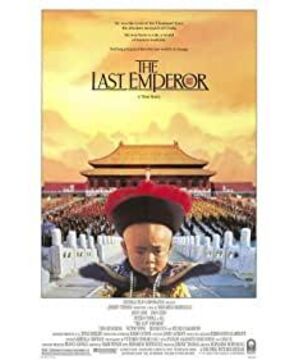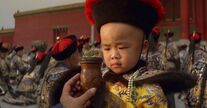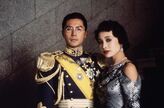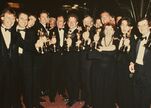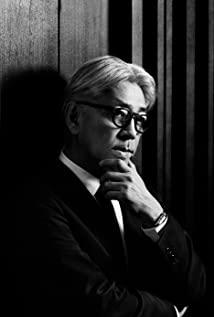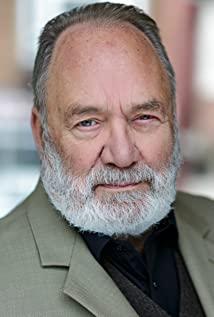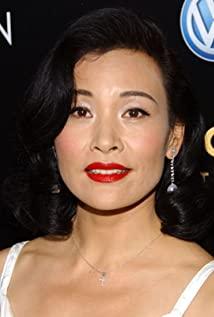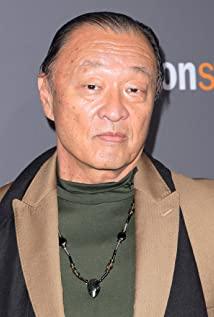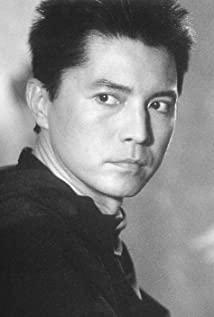Puyi's life is told in the movie. He has been on the throne since he was three years old. In his young eyes, there is only a grasshopper on the minister's body. Jiangshan is just an unknown term in his mind. When he grew up, he thought he could change, but the eunuch burned the court account books. He thought he was the master of the Qing Dynasty, but he became the puppet of the Japanese.
After liberation, he got on the train back from Russia, surrounded by PLA troops who were escorting him to monitor him. He guessed that he would die, so he hid in the small bathroom and committed suicide by cutting his veins. Yet he did not die on the train, and the mockery of fate awaited him. The ups and downs of the Cultural Revolution left scars on his body.
The film opens with a two-minute yellow-green-based scene with some strong Chinese classical elements. Seals, Forbidden City, window lattices, partitions, patterns. But all the shades are not as fresh and beautiful as they are usually thought, with the richness of red and yellow. Monotonous, dark yellow and green colors appear in each scene in turn, making people feel numb. This is the court, this is the old China, this is the place where Puyi was besieged - the beginning seems to tell the audience that. It tells the audience that what follows is a depressing, sympathetic story. The accompanying drum beats with almost no rhythm changes also aggravated this emotion. The opening of "Seven Samurai" is a five-minute subtitle with drum beats. It is also about an uneasy year, and it is also about the last nobles. The opening of the Seven Samurai and the opening of the last emperor have a deja vu factor.
The emotion rendered in the opening sequence is interrupted by a whistle. A very flat lens, black and white is clear, clean and clear, the gray part is dark green. This is the era of the green army: rigorous, without any extra decoration; this is the place for the trial of war criminals: black and white, oppressive, rational.
In this film, the use of light is one of the most interesting features. The entire film uses almost all natural light, but every shot is absolutely meticulously designed. Director Bertolucci said: "In the Forbidden City, Puyi never got direct sunlight, he was always in the shadows. During this period of life, he was always isolated from the outside world. Later, when he The more we learn from our teacher Johnston, the more we feel the sun shining on him, and the battle between light and shadow gradually unfolds, just as the conscious and unconscious wrestle in you. In the Manchukuo part of the story, when he is used as a puppet emperor by the Japanese, and he himself dreams of returning to his empire, the shadow almost covers the whole picture again, as if he was back in his childhood. Later, In prison, he reflects on his own life. The more he understands many things, the more and more light and shadow are balanced, and he should end your life in a perfect balance of light and shadow, in a stable tone. I only hope that this vision can be realized." Throughout the film, light symbolizes openness and fulfillment, while shadow symbolizes closure and depression.
When Pu Yi poured hot water into the sink to cut his wrists, the whole room was dark. The only bright light passed through the high window and pressed on Puyi's face in a sharp angle. Then the camera panned to the mirror image in the mirror above the sink. Puyi's face was perfectly cut due to the light. Black and white halves. The action of cutting his wrists, he was forced to choose, the surface peace and calmness are all false, he carries the dignity of an emperor and the pain of being a king of a subjugated country.
When the film fell into Puyi's deep memories, the tone changed to a warm yellow, warm, but monochrome. As if to tell everyone that this is a memory, warmth is just an illusion, and this is also a depressing place. The dark sky light accentuated the ritual sense of the silhouette. Puyi was taken away by a group of black silhouettes in such a black silhouette and entered a dark sedan chair.
There is one thing worth noting when Puyi enters the palace. Puyi cried in the sedan chair and said, "I want to go home." Grandma said to him, "No, you see this is the Forbidden City." At the same time, the camera cut to a group of stationary camels outside the sedan chair. .
The sky of the Forbidden City was gray, the ground was gray, and the city was oppressive black. Only the palace gate that had not been closed when Puyi came in just now revealed a light that was very different from the entire scene. And all the people walked into the darkness with their backs on their backs and turned themselves into a black silhouette. Grandma told him no, you can't go back. From now on, the Forbidden City will be your only home.
Puyi was led by the eunuch into the palace of the Empress Dowager Cixi. Although it was daytime, the hall was lit, and although the lamp was lit, he could not see anything clearly. The eunuch kowtowed beside Puyi to block all the light on his face, and when the queen mother was talking to him, there was light on her face and Puyi was once completely hidden in the dark part, which was almost invisible. The metaphor was obvious.
After Puyi ascended the throne, the color was relatively brighter. After all, a healthy Puyi had more life and vitality than a dying Cixi. The dull inauguration ceremony was not suitable for the three-year-old Puyi. No matter how the ministers around him persuaded him, with a crisp "Look", Puyi pointed to the outside of the palace. It seemed like another world outside the yellow curtain. But when I opened it, I found that nothing had changed. The adults outside the door gave three kneels and nine kowtows under the unified command. The significance of the glorious palace was not as good as a cricket, and a turtle could make him smile more. The tones are the same, gray, the vast dark side.
In the film, a large number of Puyi's status as a prisoner is interspersed with the memories of being a prince. The recall lens uses less light and highlights the dark parts. In the current lens, the light and dark parts are mostly gray, and the bright parts are exposed to white. Clear and intuitive distinction.
I once said in the analysis of "Inception" that in general, the film will be tinted yellow or blue, and rarely will it be tinted to dark green. The color palette of Inception is due to the feeling of highlighting the code space, and in "The Last Emperor", green represents the authority of the army, and yellow represents the final dignity of the royal family.
After Pu Yi and Pu Jie met, he recalled the first time he saw Pu Jie. Back then everyone was playing together in the palace but now they are all prisoners. The transition between shots is naturally invisible, and the narrative is clearly explained. Although the actors have changed, I don't feel uncomfortable.
Through several meetings with Pu Jie, Pu Yi gradually grew up, became an emperor again, and became a deposed emperor. This was the first turning point he knew, and his face gradually became brighter. It was the light of his gradual gain of freedom that was different from the old court etiquette. He was still a child, but he had to endure the ups and downs of a world that was not his.
The turning points of the next two clips are extremely contrasting. In the previous shot, the young Puyi was chasing the grandmother's sedan chair in the palace, and the front of the empty Forbidden City was overgrown with weeds. In the latter shot, a group of people in dark political prison clothes sang "Mao Zedong Out of China", which was airtight. Sparse versus dense, quiet versus noisy, the difference between the past and the present is highlighted.
Narrated to about the 40th minute [mine is the 2 hours and 43 minutes version] the whole film seems to have bright and dazzling sunlight for the first time. Even in the previous paragraphs of memory, there is no such bright golden warm sun. Student parade, the real spring is here.
At this time, Puyi grew up, wearing a dragon robe, and met his new master, Johnston, in the Forbidden City. He brought Puyi a new world. At the same time, the student movement outside the Forbidden City was massively suppressed by the government of the Republic of China. Inside and outside the palace were two completely different worlds. One day, Mr. Johnston rode his bicycle into this broken palace and saw Puyi and a group of people playing a guessing game with a cloth. Puyi enjoyed the rare feeling of being surrounded by many hands. Later he learned to bike. The bicycle took him to the gate of the Forbidden City, took him to the gate of a different world, and then the light was closed, and the light within reach was turned into darkness, and the authority of the emperor was useless here.
Johnston has a sentence right: "The emperor is like a prisoner in the palace. He is still a prisoner from the time he ascends the throne until he abdicates. When the emperor grows up, he will wonder why he is the only one who is not allowed to go out...I think the emperor is the most miserable in the world. children.”
Through the interrogation of the revolutionaries, Puyi began to recall his past paragraph by paragraph. The reform he tried in the palace, his first cooperation with Japan.
It was Puyi who received part of the new education, played tennis with his concubine, and then another group of soldiers came to the Forbidden City. His face, which had just been hit by the bright sun, was heavily shadowed again. He turned his back to the camera after he received the deportation order. Puyi's mood at the time was that no one could perform in front of the camera.
The establishment of a puppet Manchukuo would be humiliating and unbearable in the eyes of others, but Puyi may have hope. He has a chance, a chance to return to the world he wants. When he came to the throne again the colors were bright, blue sky and yellow earth, everything seemed so promising, and then it turned out that it was just another dream, a maddening dream.
When Puyi met the former Manchukuo officials and the current prison director in prison, everything seemed to be completely revealed. During these two periods of time, the light on his face was half-bright and half-dark. It is conceivable that Puyi's inner struggle changed at this time.
After being released, Puyi's face finally got light. The story finally came to an end, and several scenes repeatedly guided the tour into the Forbidden City, and the story ended.
Suddenly a dream.
View more about The Last Emperor reviews


